Once past the front door, lavender infiltrates your senses immediately. This is the right place. The closer you come to the doorway, the more complex the smells become. Vanilla, rosemary and jasmine start to tickle your nose. Cinnamon and clove come more into focus with each step. The hallway would be dull without the exhilarating smells that float you up the stairs to the first apartment on the left.
Shamus McClain opens the door wearing his signature hat, a newsies cap. His smile is infectious and his soaps are everywhere. The studio where Shamus lives has art all over the walls, a Himalayan salt lamp burning seemingly always and two cats, Gus and Oliver, lounging on the furniture. This same studio operates as the factory floor, distribution office and classroom of Shamus’s business: Real. Soaps.
“This has changed my life completely, seriously. And the last four years, I’ve learned so much. I’ve learned so much about myself and what I’m capable of,” Shamus said. “This is for sure the hardest thing I’ve ever done in my life.”
Real. Soaps started as a passion project that mirrored Shamus’s green lifestyle. Since then it has occupied the shelves of West Elm and made its way into Chicago’s artisan soap scene. Originally from Troy, New York, Shamus said he would always rather be outdoors. The smells of fresh peppermint and lavender fields have made their way into his soaps, and his respect for the environment manifests in his soapmaking process. In a cupboard under the sink, his cleaning supplies consist of vinegar and baking soda. I thought I was doing my environmental part by buying cleaners with little leaf emblems on them. It turns out, vinegar, baking soda and maybe some hydrogen peroxide is all you need to keep your home spotless and your air fresh.
The moment of recognition for Shamus came as it does for many of us: on Netflix. He was moved by a documentary, Chemerical, that tracks one family’s journey after taking Glade plug-ins, dish detergent, shampoo and chemicals out of their home. The air quality was tested before and after, and before the chemical clean out it was near toxic levels.
In recent years, there has been a push to understand how the products we use as consumers affect our bodies and our general health. The conversation has reflected the idea that we have a right to know what goes in and on our bodies. The fight for accurate food labels and calorie disclosure is widespread. With American obesity rates steadily on the rise, understanding the relationship between food and health has become vital. The fight to understand what exactly “organic” and “all natural” means extends from the food world and into cosmetics. Our skin is the body’s largest and most vulnerable organ, yet body care like soap, body wash, lotion and cream does not need approval from the FDA.
The 1938 Federal Food, Drug & Cosmetic Act does not regulate the cosmetic field as heavily as food or drugs. Incidents such as the discovery of lead in lipsticks do not need to be reported publicly as we have seen with food and drug recalls. We as consumers assume being an “informed buyer” means taking the time to read labels and steering clear of synthetic fragrances and dyed purple lotions with names like “Enchanted Sprite Forest” and “Magenta Rain Dream.” Sadly, harmful chemicals come in all shapes, sizes and pretty packaging. It is often difficult to know what the ingredient list on the back of a cosmetic product means and the ways it can affect our health. Shamus has done extensive research. The products he makes are often based off of his own need for a healthy alternative to brand name products with questionable ingredients.
The actual components of soap are widely disputed. Many brands claim they make soap without glycerin which in reality is the byproduct of the chemical reaction that is required for soap to occur. Soaps are made from fats and oils, or their fatty acids, by treating them chemically with a strong alkali. So therefore all soaps involve chemical reactions, but this does not mean that the chemical treatment of a substance such as lye is harmful to health or skin. The FDA itself has extremely specific qualifications for what makes something a soap and what excludes it from this title, specifically:
- the bulk of the nonvolatile matter in the product consists of an alkali salt of fatty acids and the product’s detergent properties are due to the alkali-fatty acid compounds, and
- the product is labeled, sold, and represented solely as soap
In other words, the FDA sees soap as a product whose hygienic effects–those that we typically attribute to “soap”–are the result of its chemical makeup, specifically its alkali-fatty acid compounds. While this may seem hyper-specific, it’s worth noting that Dove and other products are designed around their moisturizing effects, adding detergents for hygienic purposes. It is the addition of these detergent agents that exempt them from the FDA’s definition of soap.
Outside of these additive detergents, just because something is labeled as containing “all-natural” papaya doesn’t mean it can’t cause rashes, irritation or damage to our skin. Instead, we find out more and more often there really is no regulated meaning as products claim to be organic despite synthetic ingredients and harmful active ingredients. This includes baby products, supposedly designed for the most sensitive and vulnerable skin possible.
“I met a lady who was taking a trip to the Amazon and apparently when you go there you can only take things that are biodegradable, so she took my soap,” Shamus said.
The synthetic liquid substance propylene glycol is on a variety of ingredient watch lists. The FDA has concluded that there is no reason to believe that it is a “hazard to the public” when they are used at levels currently in circulation, according to the FDA website. Public health organizations such as Agency for Toxic Substances and Disease Registry have full toxicology reports on Propylene glycol. According to the ATSDR, it is “used to absorb extra water and maintain moisture in certain medicina, cosmetics, or food products” as well as a “used in antifreeze or deicing solutions.” Propylene glycol also shows up in food containing “natural flavors” according to the research done by EWG. The FDA has not defined the term “natural” and therefore these flavors can contain synthetic chemicals such as the solvent propylene glycol or the preservative BHA. The consensus on this specific ingredient example is not necessarily that it will cause grave health concerns but that it is not accurately defined and therefore mislabeled and often misrepresented by “natural” labels. More often than not, even the blanket term “organic” does not protect us.
“Propylene glycol is one of the main ingredients in most deodorants and there’s no difference between that and plain deicer. I started making the powder deodorant because for me deicer has no place on my body,” Shamus said.
Soon after Shamus began doing research into the world of abrasive chemicals, Clorox under his sink was a thing of the past. Potentially harmful chemicals have no place in Shamuses home, on his body and in the lives of his customers. He has added a line of baby soap to his business (marked by a little duck stamp) made entirely of non-abrasive products.
“People think that they really are doing good by buying the antibacterial soaps and the formula 409s, and it’s just really bad for you,” Shamus said.
Interestingly enough, Real. Soaps was not his first draft. Instead, Shamus and his former business partner who has since parted ways with the company originally went into the cleaning business. Equipped with ingredients that normally go into cucumber salads and bundt cakes, Shamus and his associate went house to house trying to share what they learned.
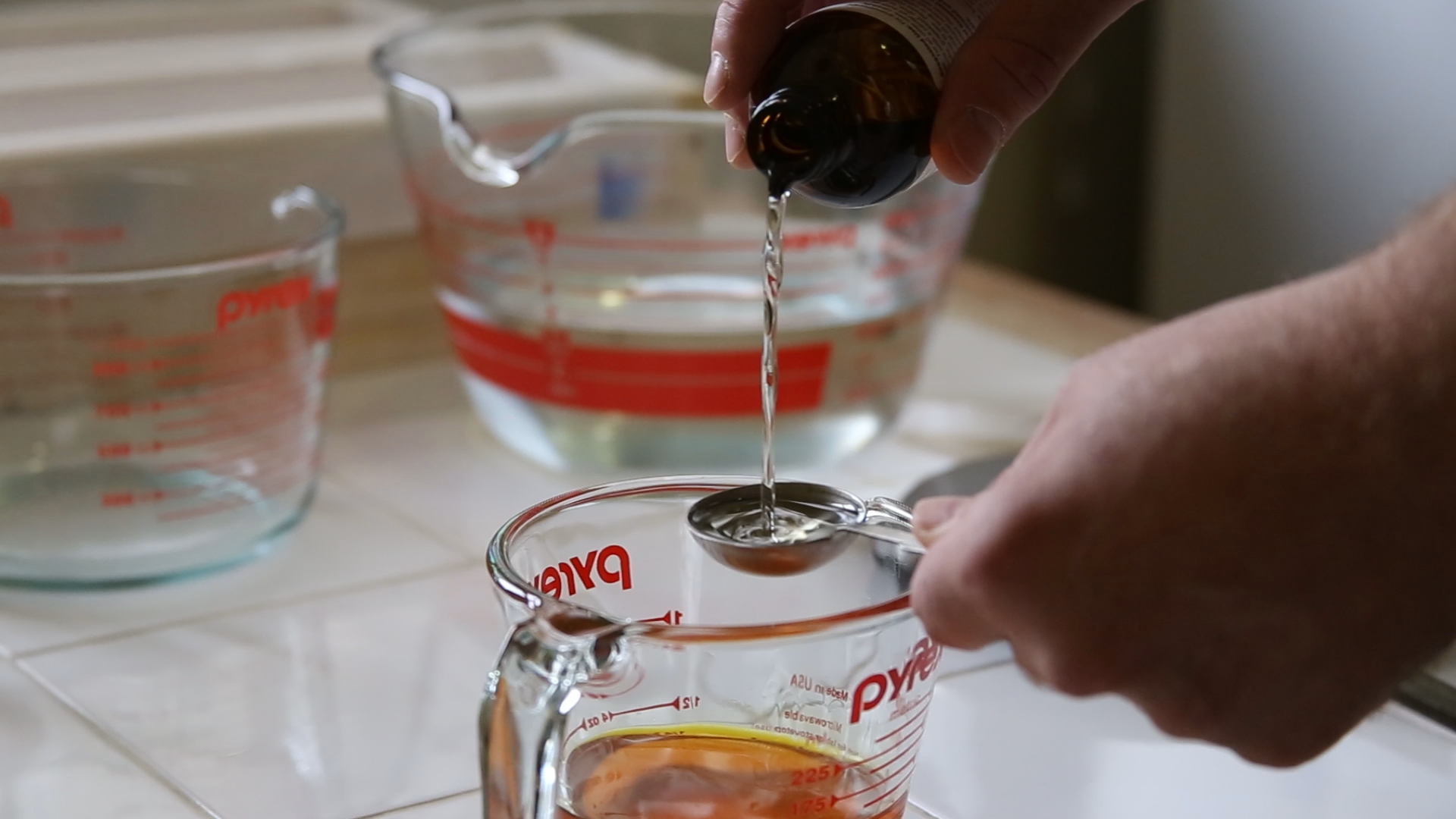
Orange essential oils being measured for a batch of soap (Steven Long, 14 East Magazine)
“We were going to be little green house cleaners, but cleaning other people’s houses is no fun,” Shamus said. “Soap is what you need to clean everything. Soap and water. So then we just tried different recipes and learned how to make soap. The rest is history.”
Real. Soaps was born. Operating out of a studio apartment on the North Side of Chicago, Shamus measures, mixes and packages every bar of soap that leaves his home. The recipe sheet is tattered, stained with essential oils and yellowing from the amount of use. Shamus takes the term “hand-made” to a new extreme. His first bar was Rosemary Lavender, and it took a number of trials to find the right formula. Each bar is cut and dried on the drying rack for three months before being shipped to its owner. In the closet, bars of charcoal, rosewater sea salt, lavender oatmeal, and so much more await their ready dates.
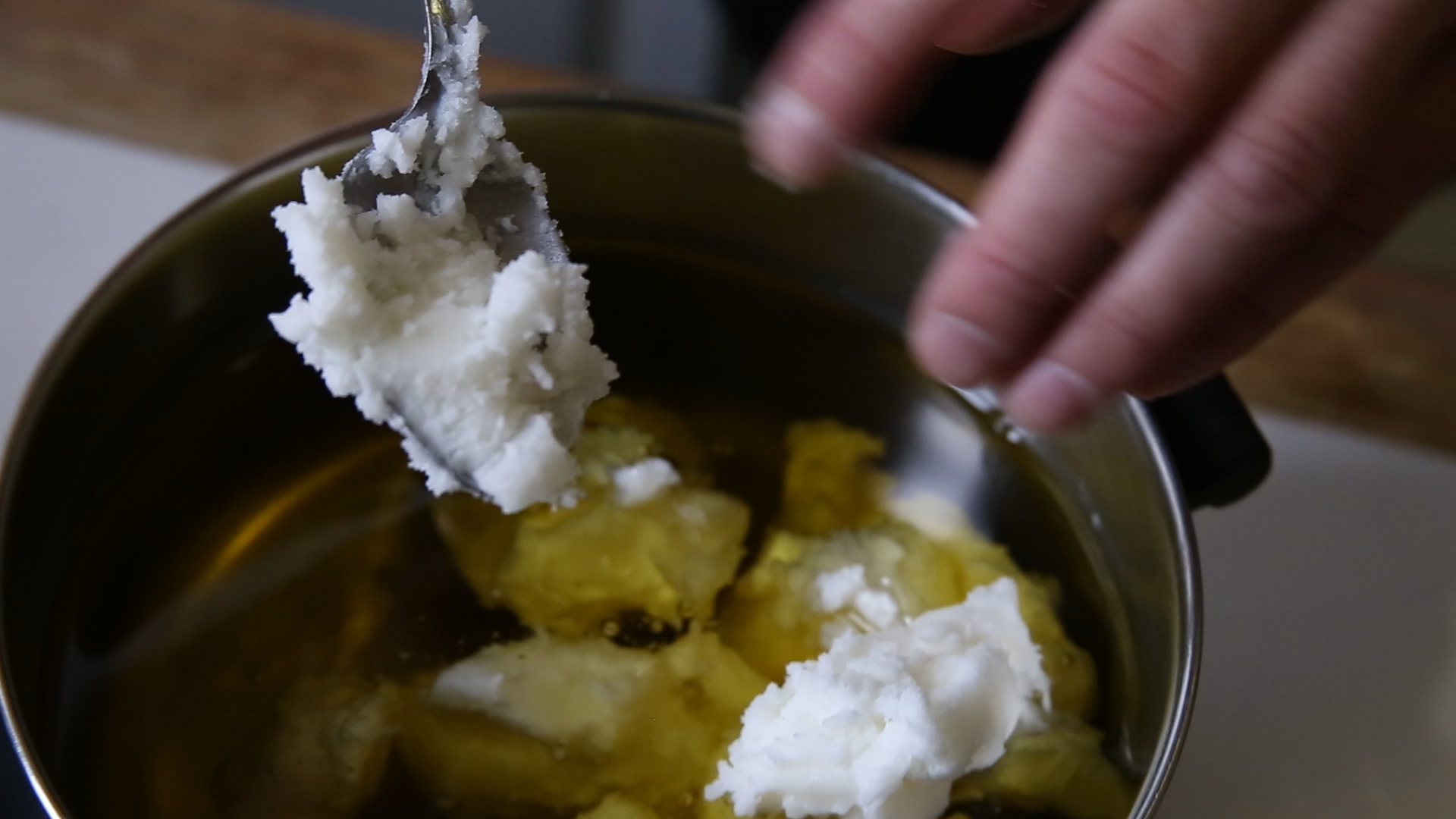
Coconut oil and olive oil mix together for the base of each bar of soap (Steven Long, 14 East Magazine)
“Most soaps — like commercial soaps — aren’t ‘soaps’: they’re detergents,” Shamus said. “For example, you will find the word “soap” nowhere on a box of Dove. So we wanted to really nail that it was real soap. Like actually soap.”
Shamus’s kitchen looks fairly normal until you start looking carefully. Slowly, you realize that his pantry, shelves and cupboards are bursting with soap supplies. Giant tubs of coconut oil sit on the floor and massive olive oil tins take up shelf space.
There is finely ground pumice powder, lavender sprigs and sea salts on his shelves. If you open any cupboard, neatly packaged chapsticks, deodorants and clove candles collapse on top of you. Every single nook and cranny has a signature smell. Soap — for all intents and purposes — has taken over his life.
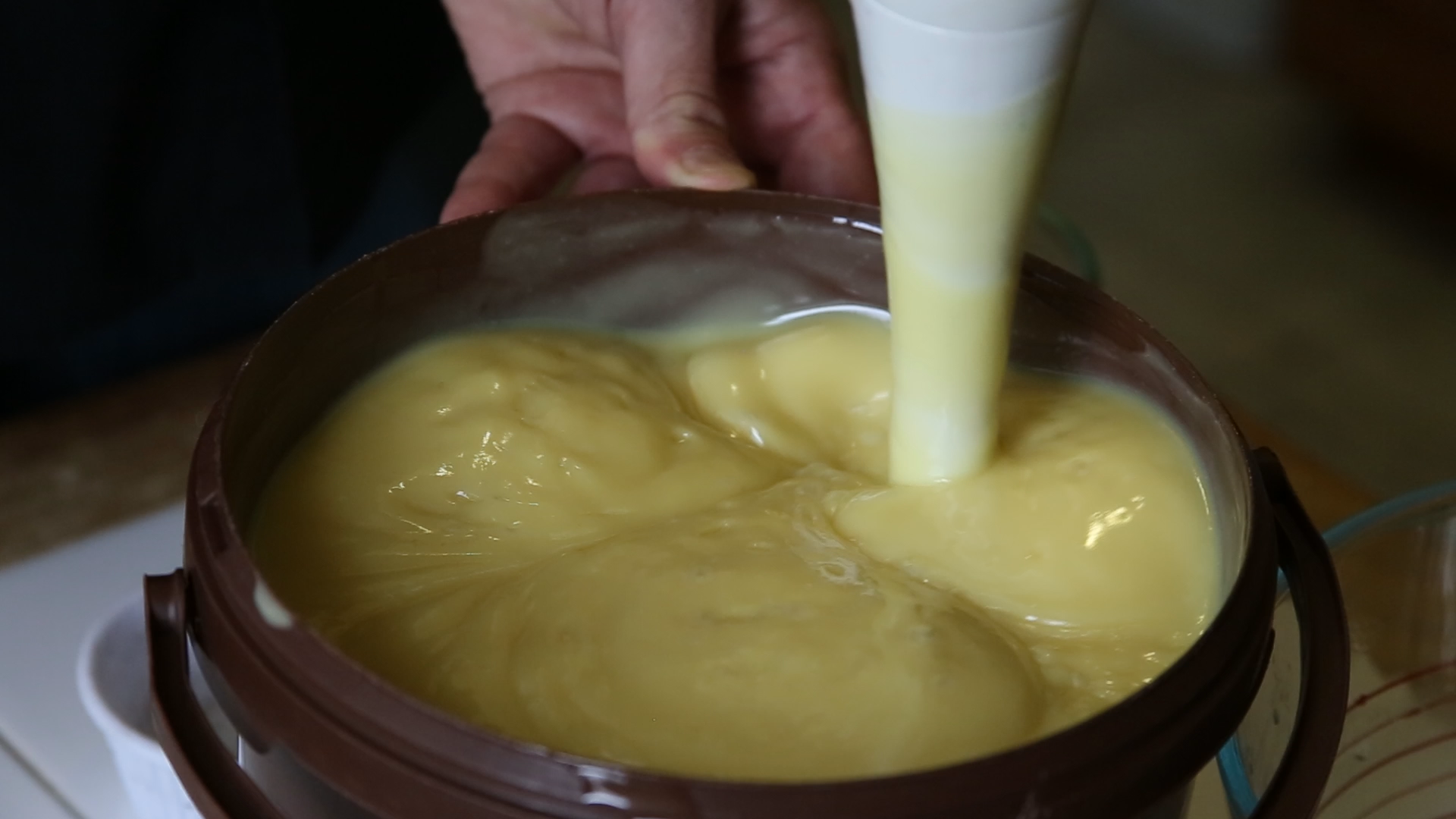
After being heated to around 127 degrees, the oils are mixed together. (Steven Long, 14 East Magazine)
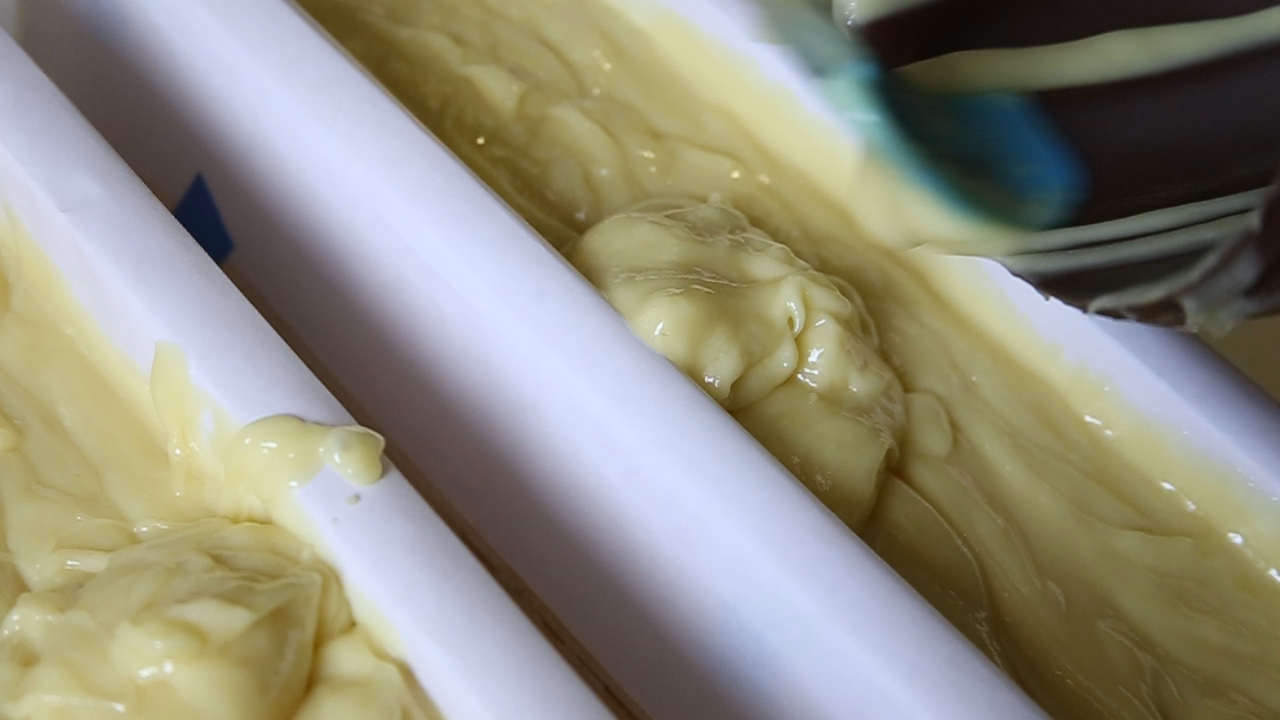
When at the right consistency the soap material is poured into wooden containers that will hold it until dry. (Steven Long, 14 East Magazine)
The soaps, chapsticks and deodorants are wrapped in Real. Soaps signature brown packaging. Overall, Real. Soaps’ carbon footprint is almost nonexistent.
“Everything’s recycled: my cards, my labels, my everything. It’s all recycled and recyclable. That’s important,” Shamus said.
This process of turning a studio into a factory floor was not simple. It was self taught. For that reason, it is filled with nuance and detail unknown by the outside world. For instance, every single bar of soap Shamus has ever been made has been cut by the same tool: a Pooh Bear pen out of ink.
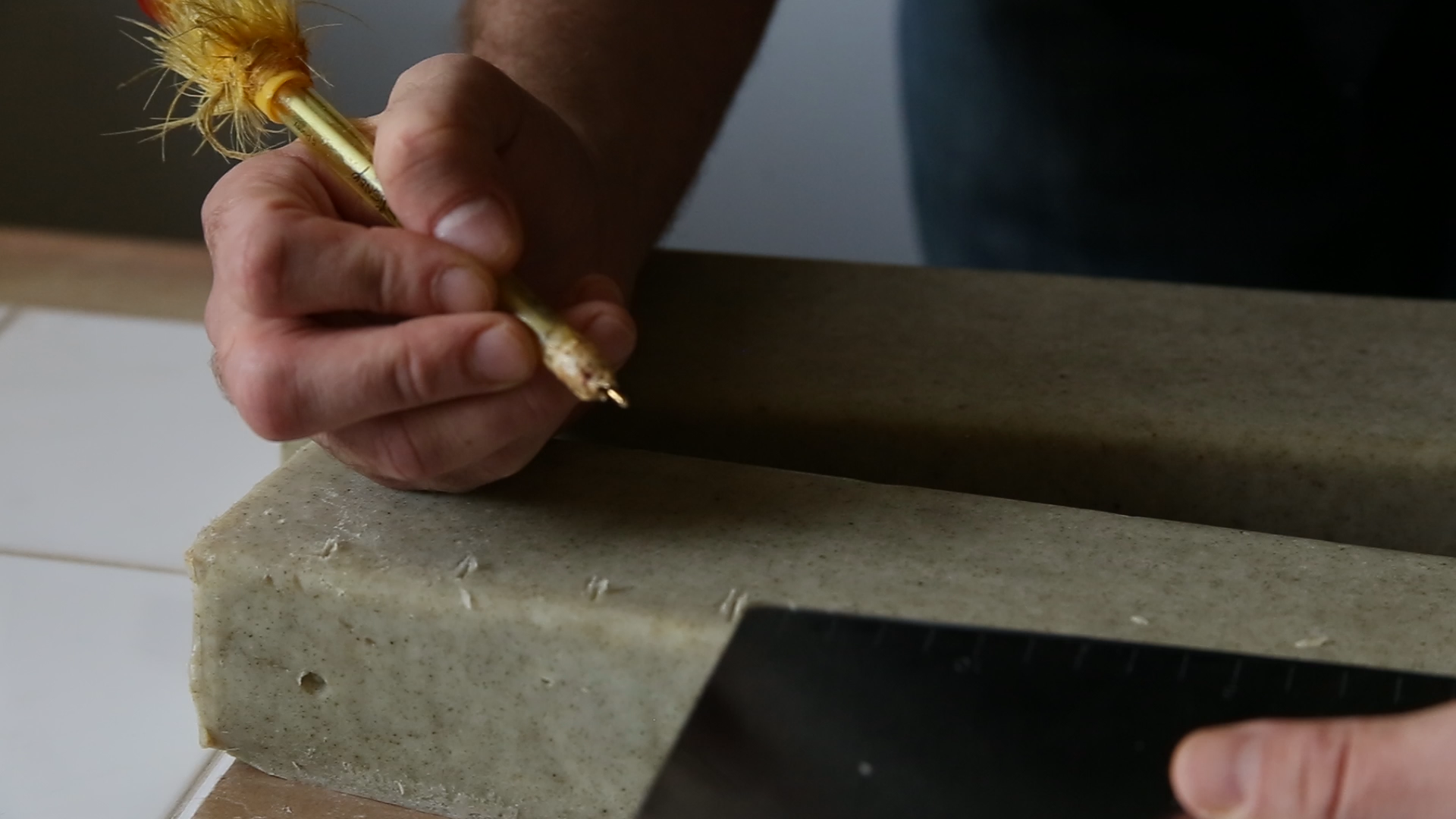
While still soft enough to cut easily, Shamus makes markings on the dried bar with the Pooh Bear pen. (Steven Long, 14 East Magazine)
“I don’t even know why I still have it,” Shamus said. “It’s just that every bar has been cut with it, so it’s just how I do it.”
This is the mark of a craftsman. The process is filled with idiosyncrasies and Shamus-isms that make every batch different and every bar unique. I watch him rifle through his essential oils cabinet, looking for orange, vanilla and clove. The vibrant orange oil overflows in the measuring spoon and Shamus shrugs. No batch is exactly the same as the last, but the process remains all natural.
“The pooh thing I would never change. Even if someone bought me the wire cutter I don’t think I would use it,” he said.
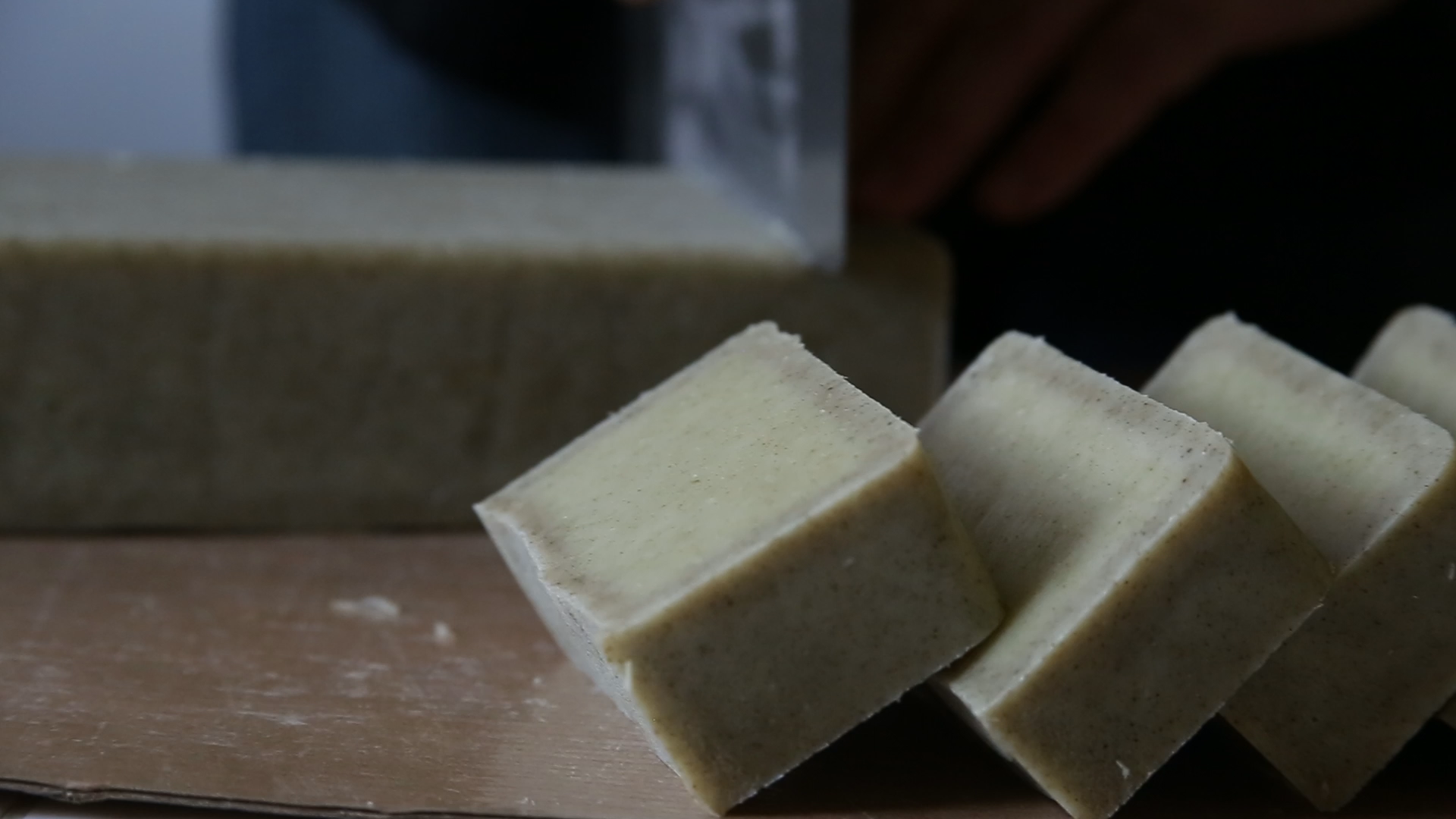
Bars are cut one by one. (Steven Long, 14 East Magazine)
Every fragrance featured in his soaps, deodorants and beeswax candles is made from essential oils. There are no synthetic fragrances of any kind. Essential oils do not come out of every plant naturally. For instance, honeysuckle does not produce an essential oil, so everything you have smelled that claims it is made of honeysuckle was synthetic.
It is a competitive business, but world of soapmaking has room for more than just one craftsman. The local businesses in Chicago are fairly symbiotic and often support each other in all kinds of ways.
“I sell my stuff around the corner at the coffee shop and I use their coffee to make my coffee soap,” Shamus said.
All over Chicago, artisan soap makers come together for craft shows and festivals. They all have their own unique formulas, flavors and ratios.
“It’s this total underworld that exists and[they’re] just really great soapmakers,” Shamus said.“You would think that we wouldn’t be friends, but we really are.”
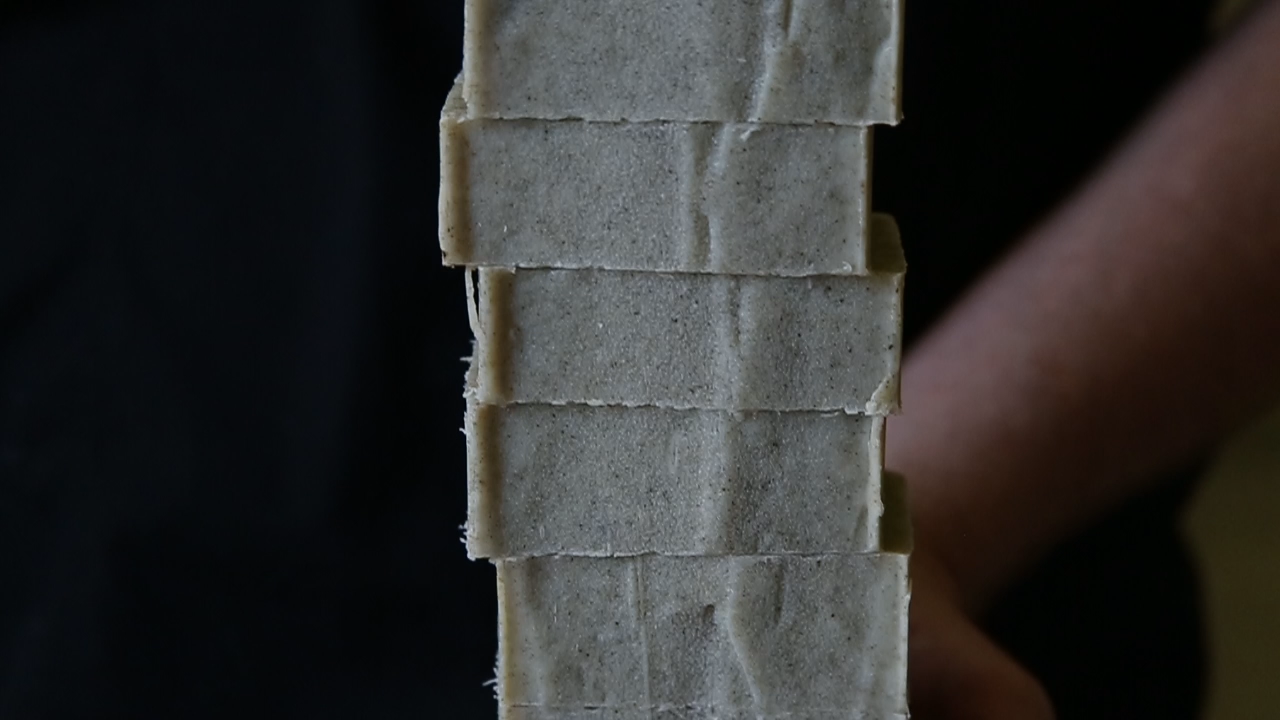
After measuring, mixing, pouring, drying and cutting: these bars are ready for the drying rack. (Steven Long, 14 East Magazine)
With West Elm requesting more and more orders, craft shows all over Chicago and soapmaking classes in full swing. Shamus remains dedicated to his soaps. There are over 30 local businesses in Chicago carrying his soaps and mom’s contacting him constantly. As he approaches his fifth year in the soap business, there are big things on the horizon.
“One more year, and we’ll do a soap tattoo,” Shamus said. “I think it will involve bubbles, but outside of that I’m gonna leave it up to the artist.”
Header image: Shamus McClain in his studio labeling chapsticks. (Ivana Rihter, 14 East Magazine)
All Real. Soaps products can be found online at www.realsoaps.com, on Etsy or around the city of Chicago sold at local businesses.


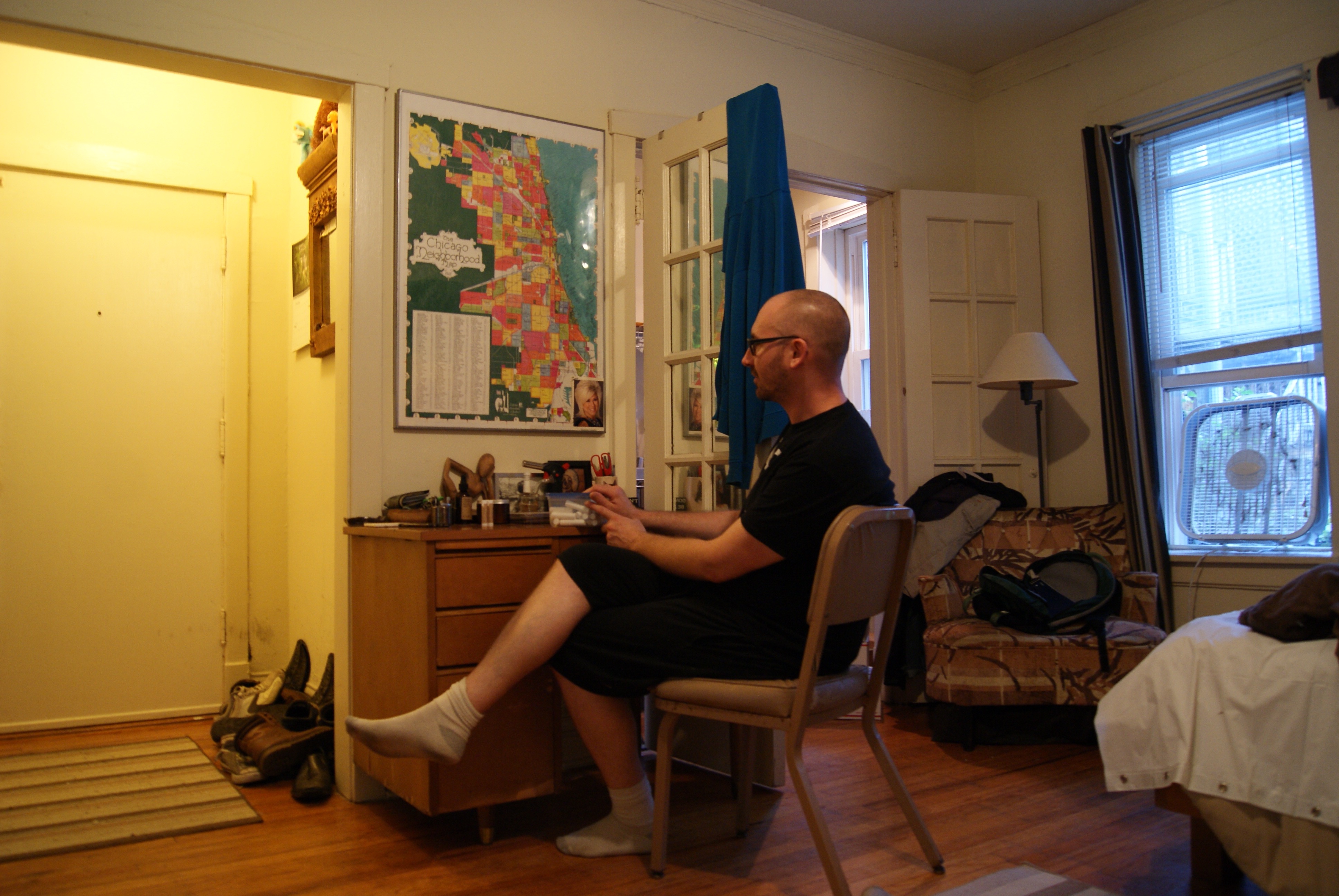

NO COMMENT